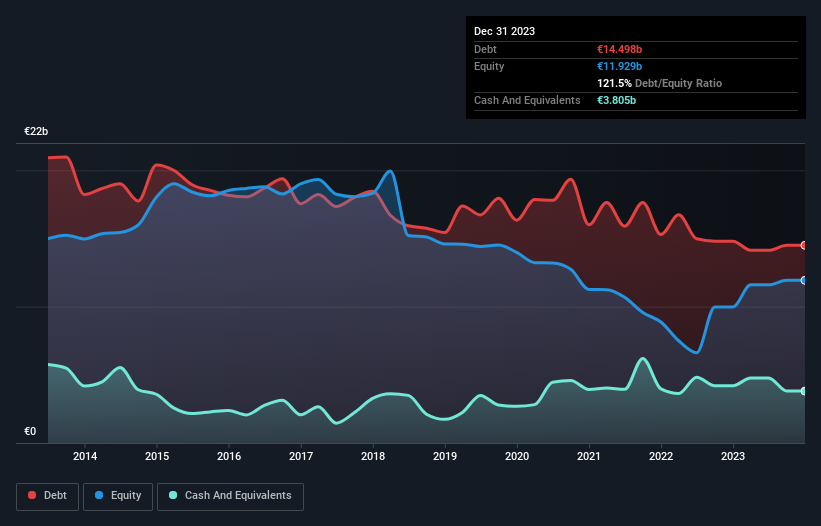
Howard Marks put it nicely when he said that, rather than worrying about share price volatility, 'The possibility of permanent loss is the risk I worry about... and every practical investor I know worries about.' When we think about how risky a company is, we always like to look at its use of debt, since debt overload can lead to ruin. We can see that Naturgy Energy Group, S.A. (BME:NTGY) does use debt in its business. But the more important question is: how much risk is that debt creating?
When Is Debt A Problem?
Debt and other liabilities become risky for a business when it cannot easily fulfill those obligations, either with free cash flow or by raising capital at an attractive price. Part and parcel of capitalism is the process of 'creative destruction' where failed businesses are mercilessly liquidated by their bankers. However, a more common (but still painful) scenario is that it has to raise new equity capital at a low price, thus permanently diluting shareholders. By replacing dilution, though, debt can be an extremely good tool for businesses that need capital to invest in growth at high rates of return. The first step when considering a company's debt levels is to consider its cash and debt together.
See our latest analysis for Naturgy Energy Group
How Much Debt Does Naturgy Energy Group Carry?
The chart below, which you can click on for greater detail, shows that Naturgy Energy Group had €14.5b in debt in December 2023; about the same as the year before. However, it also had €3.81b in cash, and so its net debt is €10.7b.

How Strong Is Naturgy Energy Group's Balance Sheet?
According to the last reported balance sheet, Naturgy Energy Group had liabilities of €7.09b due within 12 months, and liabilities of €18.9b due beyond 12 months. Offsetting this, it had €3.81b in cash and €3.22b in receivables that were due within 12 months. So its liabilities outweigh the sum of its cash and (near-term) receivables by €18.9b.
This is a mountain of leverage even relative to its gargantuan market capitalization of €22.4b. Should its lenders demand that it shore up the balance sheet, shareholders would likely face severe dilution.
We measure a company's debt load relative to its earnings power by looking at its net debt divided by its earnings before interest, tax, depreciation, and amortization (EBITDA) and by calculating how easily its earnings before interest and tax (EBIT) cover its interest expense (interest cover). Thus we consider debt relative to earnings both with and without depreciation and amortization expenses.
With a debt to EBITDA ratio of 2.1, Naturgy Energy Group uses debt artfully but responsibly. And the alluring interest cover (EBIT of 7.8 times interest expense) certainly does not do anything to dispel this impression. Naturgy Energy Group grew its EBIT by 9.5% in the last year. Whilst that hardly knocks our socks off it is a positive when it comes to debt. When analysing debt levels, the balance sheet is the obvious place to start. But it is future earnings, more than anything, that will determine Naturgy Energy Group's ability to maintain a healthy balance sheet going forward. So if you want to see what the professionals think, you might find this free report on analyst profit forecasts to be interesting.
Finally, while the tax-man may adore accounting profits, lenders only accept cold hard cash. So the logical step is to look at the proportion of that EBIT that is matched by actual free cash flow. In the last three years, Naturgy Energy Group's free cash flow amounted to 49% of its EBIT, less than we'd expect. That's not great, when it comes to paying down debt.
Our View
Based on what we've seen Naturgy Energy Group is not finding it easy, given its level of total liabilities, but the other factors we considered give us cause to be optimistic. In particular, we thought its interest cover was a positive. We would also note that Gas Utilities industry companies like Naturgy Energy Group commonly do use debt without problems. When we consider all the factors mentioned above, we do feel a bit cautious about Naturgy Energy Group's use of debt. While we appreciate debt can enhance returns on equity, we'd suggest that shareholders keep close watch on its debt levels, lest they increase. When analysing debt levels, the balance sheet is the obvious place to start. However, not all investment risk resides within the balance sheet - far from it. Be aware that Naturgy Energy Group is showing 3 warning signs in our investment analysis , and 1 of those is a bit concerning...
If you're interested in investing in businesses that can grow profits without the burden of debt, then check out this free list of growing businesses that have net cash on the balance sheet.
Valuation is complex, but we're here to simplify it.
Discover if Naturgy Energy Group might be undervalued or overvalued with our detailed analysis, featuring fair value estimates, potential risks, dividends, insider trades, and its financial condition.
Access Free AnalysisHave feedback on this article? Concerned about the content? Get in touch with us directly. Alternatively, email editorial-team (at) simplywallst.com.
This article by Simply Wall St is general in nature. We provide commentary based on historical data and analyst forecasts only using an unbiased methodology and our articles are not intended to be financial advice. It does not constitute a recommendation to buy or sell any stock, and does not take account of your objectives, or your financial situation. We aim to bring you long-term focused analysis driven by fundamental data. Note that our analysis may not factor in the latest price-sensitive company announcements or qualitative material. Simply Wall St has no position in any stocks mentioned.
About BME:NTGY
Naturgy Energy Group
Engages in the supply, liquefaction, regasification, transport, storage, distribution, and sale of natural gas.
Average dividend payer and fair value.

